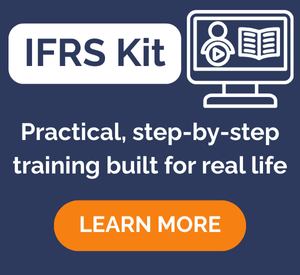IFRS 17 – The 3 Greatest Misconceptions
To err is human. But the following mistakes are not the ones you can afford to make in a board meeting or a job interview. Because, no matter how right these notions sound or how prevalent these views are, they are still very “wrong”:
- IFRS 17 is for insurance “companies”
- IFRS 17 is for “all” insurance contracts
- IFRS 17 is “only” for insurance contracts.
Let’s go through each of these with the objective of enhancing our understanding of the standard.
Please note: This is a guest post whose author is Mr. Imad Uddin FRM (his bio is in the end of this article).
1. IFRS 17 is for insurance “companies”
Yes, IFRS 17 would most significantly affect insurance companies.
However, whether a company is regulated as an insurance company has no bearing on the applicability of the standard. Similarly, there is no blanket exemption from IFRS 17 available to companies outside the insurance industry.
Then what is IFRS 17 all about?
Insurance Contracts, to be precise. The standard is focused on the type of the contract rather than the type of the company.
This means that if our understanding of an insurance contract is limited to the presumption that an insurance contract is “a contract issued by an insurance company”, then clearly, we need a massive overhaul of our existing understanding.
How can we understand insurance contracts independent of the type of company that issues them?
This requires an understanding of the insurance risk. This is broader than you might think. To be classified as an insurance risk it has to fulfil only 2 conditions:
- Condition 1
The risk must be “transferred” from policy holder to the issuer.Quite obviously, an entity’s own risk cannot be an insurance risk. To be an insurance risk some other party must undertake it.
What’s not so obvious is the fact that the risk should be specific to the policy holder. After all, it is being transferred “from” the policy holder.
Special For You! Have you already checked out the IFRS Kit ? It’s a full IFRS learning package with more than 40 hours of private video tutorials, more than 140 IFRS case studies solved in Excel, more than 180 pages of handouts and many bonuses included. If you take action today and subscribe to the IFRS Kit, you’ll get it at discount! Click here to check it out!
Specific to the policy holder?- If a contract required the issuer to pay a specified sum to the policyholder if there is an earthquake in Banana Island, this risk may not qualify as an insurance risk. Because the risk is not specific to the policyholder. Earthquake is a broad contingency.
- On the other hand, if the contract requires the issuer to compensate the policyholder in case an earthquake in Banana Island damages the policyholder’s factory, the risk qualifies as an insurance risk. That’s a clever distinction!
- Condition 2
The second condition is that the risk may be any risk other than the “financial risks”.If this condition was not there, most derivatives could be classified as insurance contract. That’s what we call a scope creep. That would be nightmare for banks and other financial institutions. Creepy, isn’t it?
So, we now have to understand financial risk?
The financial risk is a risk of a possible future change in one or more of the following:
- Specified interest rate,
- Financial instrument price,
- Commodity price,
- Currency exchange rate,
- Index of prices or
- Rates, credit rating or credit index or
- Other variable, provided in the case of a non-financial variable that the variable is not specific to a party to the contract.
On the contrary insurance risks include risks such as:- Death or survival
- Injury
- Illness
- Disability
- Loss of property due to damage or theft
- Failure of a debtor to make a payment when it is due
- Possible change in a non-financial variable that is specific to a party to the contract
That might sound overwhelming, but here is a workaround. We can have a good comprehension of insurance risks, by conceiving it as an “adverse” affect “specific to the policyholder”.
So, coming back to our original question, what are insurance contracts?
According to IFRS 17:
“A contract under which one party (the issuer) accepts significant insurance risk from another party (the policyholder) by agreeing to compensate the policyholder if a specified uncertain future event (the insured event) adversely affects the policyholder.”
So now we know what IFRS 17 is all about.
But the definition is considerably broad. Does this mean warranties issued but the retailers and fixed fee contracts issued by the service providers are also within the scope of IFRS 17?
This leads us to the second greatest misconception.
2. IFRS 17 is for “all” insurance contracts
No, IFRS 17 is not applicable to all insurance contracts. Following are some common outright exemptions:
- Warranties provided by a manufacturer, dealer or retailer in connection with the sale of its goods or services to a customer,
- Residual value guarantees provided by a manufacturer, dealer or retailer and a lessee’s residual value guarantees when they are embedded in a lease,
- Contingent consideration payable or receivable in a business combination,
- Employers’ assets and liabilities that arise from employee benefit plans and retirement benefit obligations reported by defined benefit retirement plans.
There are more exemptions outlined in the standard, but hey, let’s focus on what’s important. So, following are some really important concepts that need to be highlighted.
Fixed fee service contracts
If you pay a fixed fee to a maintenance company for monthly maintenance of your factory machines, the maintenance company may have to incur higher costs in particular months and little to no cost in others.
To be clear, maintenance company is indeed exposed to insurance risk and the fixed fee contract meets the definition of an insurance contract because it has agreed to compensate you if an uncertain future event adversely affects your machines.
But the standard recognizes the fact that the primary purpose in such an arrangement is the provision of service and not risk coverage.
But where do we draw the line?
How do we know that a particular contract is for the provision of health service and not health insurance, for example?
Well, for such fixed fee contracts including the one in our factory maintenance example, the standard provides an irrevocable choice to either apply IFRS 15 or IFRS 17 on a contract by contract basis.
However, this choice is only available if all of the following conditions are fulfilled:
- The entity does not reflect an assessment of the risk associated with an individual customer in setting the price of the contract with that customer;
- The contract compensates the customer by providing services, rather than by making cash payments to the customer; and
- The insurance risk transferred by the contract arises primarily from the customer’s use of services rather than from uncertainty over the cost of those services.
Financial guarantee contracts
The issuer of financial guarantee contracts may irrevocably choose to apply either IFRS 17 or IFRS 9 Financial Instruments to such financial guarantee contracts on a contract by contract basis. The choice is available if the following condition is fulfilled:
- The issuer should not have previously asserted explicitly that it regards such contracts as insurance contracts and used accounting applicable to insurance contracts
Credit card contracts
Certain components within the credit card contracts may meet the definition of insurance contracts. Such contracts are, however, not within the scope of IFRS 17 if both of the following conditions are fulfilled:
- The entity does not reflect insurance risk in the pricing
- IFRS 9 does not requires an entity to separate an insurance coverage component that is embedded in such a contract.
Contracts that limit compensation to policyholder’s obligation
Let’s say I need a loan of a million dollars but I don’t want the bank to recover the loan from my property in case of my death. I can enter into a loan contract with death waiver. In this case the compensation I am entitled to is limited to my obligation to the bank.
Such contracts meet the definition of insurance contracts.
For such contracts an entity can irrevocably choose to apply either IFRS 17 or IFRS 9 for each portfolio of insurance contracts.
IFRS 17 is “only” for insurance contracts
Why would a standard that is meant to address insurance contracts will be applicable to other than insurance contracts?
Well, apparently, we live in a complex world.
IFRS 17 is applicable on investment contracts with discretionary participation feature, if the issuer also issues insurance contracts.
Let me clarify, if these same investment contracts are issued by an entity which does not issue insurance contracts, these contracts will be accounted for under IFRS 9.
So, what are these investment contracts with discretionary participation features?
This is where the (insurance contract issuing) entity shares its profits to the contract holder such that:
- A portion of returns is not at the discretion of the issuer
- An additional portion whose amount or timing is at the discretion of the issuer
To meet the definition of DPF under IFRS 17 the additional portion must constitute a significant portion of total contractual benefits.
Further more the additional amount should be based on any one of the following:
- The returns on a specified pool of contracts or a specified type of contract,
- Realized and/or unrealized investment returns on a specified pool of assets held by the issuer, or
- The profit or loss of the entity or fund that issues the contract
To sum up the discretionary sharing is in the profit from a pool of the contracts or investments or in profits of the whole entity.
The variability and uncertainty in the future cash flows can be better represented under the measurement requirements of IFRS 17, hence are within the scope of the standard for entities also issuing insurance contracts.
Just in case you noticed, while clearing up the 3 greatest misconceptions, we accidentally covered the scope and key definitions in IFRS 17.
Surprize!
About the author, Mr. Imad Uddin FRM

You are welcome to check his website FYIfinancial.com.
Tags In
JOIN OUR FREE NEWSLETTER AND GET
report "Top 7 IFRS Mistakes" + free IFRS mini-course
Please check your inbox to confirm your subscription.
Leave a Reply Cancel reply
Recent Comments
- Tan Chee Hong on Retention in construction contracts
- Ahumuza on Accounting for discounts under IFRS
- Saheed Kehinde on How to account for intercompany loans under IFRS
- hassan ali on IFRS 15 Explained: Full Guide on 5-step Model for Revenue Recognition + Free Journal Entries Template
- BiG4 on IAS 23 Borrowing Costs Explained (2025) + Free Checklist & Video
Categories
- Accounting Policies and Estimates (14)
- Consolidation and Groups (25)
- Current Assets (21)
- Financial Instruments (56)
- Financial Statements (54)
- Foreign Currency (9)
- IFRS Videos (74)
- Insurance (3)
- Most popular (6)
- Non-current Assets (56)
- Other Topics (15)
- Provisions and Other Liabilities (46)
- Revenue Recognition (27)
- Uncategorized (1)




